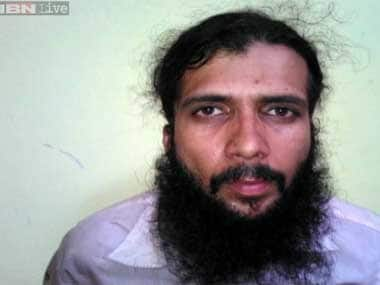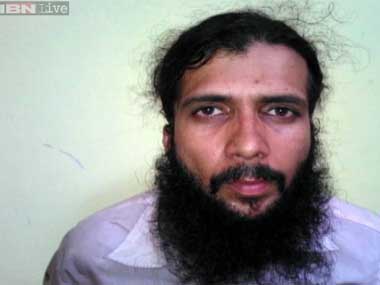Not just with bombs, a thorough investigation by the National Investigation Agency (NIA) has revealed that many of the Indian Mujahideen members are extremely tech-savvy and are expert users of online tools in planning terror activities.
According to a report published in the Indian Express
, the IM members have an “exceptional knack for information technology: they set up email accounts that disappear if they are not accessed in 24 hours, proxy servers to camouflage geographical location, encrypted files and complicated code language”. [caption id=“attachment_1603539” align=“alignleft” width=“380”]
 IM operative Yasin Bhatkal. Image courtesy ibnlive[/caption] On 7 September 2013, the NIA Special Court issued four separate search warrants to US-based Yahoo Inc, Paltalk Inc, Sophidea Inc and Hurricane Electric seeking details of IM operations using their servers. The investigating agency also traced the IP address of Nimbuzz chat to to Pakistan Telecom Company Ltd while tracing others IP addresses to France, Germany, Netherlands, Nepal and India,
the Indian Express report claimed
. The increasing use of the Internet for terror activities has become a clear challenge for the Indian security apparatus.
A report on The use of the Internet for terrorist purposes
jointly prepared by United Nations Counter-Terrorism Implementation Task Force and United Nations Office on Drugs and Crime said: “The benefits of Internet technology are numerous, starting with its unique suitability for sharing information and ideas, which is recognized as a fundamental human right. It must also be recognized, however, that the same technology that facilitates such communication can also be exploited for the purposes of terrorism. The use of the Internet for terrorist purposes creates both challenges and opportunities in the fight against terrorism.” The
Indian Express
report referring to a letter written on 14 November 2013, by Director, Criminal Division, Office of International Affairs in the US Department of Justice, Mary Ellen Warlow, to K Sai Jawahar, Under Secretary, Internal Security 11 division, Ministry of Home Affairs said that IM members were using www.fakeemailgenerator.com to generate email addresses and temporary inboxes. Users can log into the account by only using the email address and the inbox gets deleted if not accessed once in 24 hours. The stealth that the Internet provides to terrorists allows them to communicate in a secure manner.
Author Eben Kaplan ina piece called Terrorists and the Internet
says: ““The greatest advantage [of the Internet] is stealth,” says John Arquilla, professor of defense analysis at the Naval Postgraduate School. “[Terrorists] swim in an ocean of bits and bytes.” Terrorists have developed sophisticated encryption tools and creative techniques that make the Internet an efficient and relatively secure means of correspondence. These include steganography, a technique used to hide messages in graphic files, and “dead dropping”: transmitting information through saved email drafts in an online email account accessible to anyone with the password.” Such is the expertise of the IM members that they often used proxy servers to hide their location. According to the
Indian Express
report, Riyaz (Bhatkal) used filehippo.com to “open encrypted files”. The NIA claimed that Yasin and Riyaz Bhatkal had allegedly on 16 November 2013 “talked about using Freegate to be used to develop proxy”. While IM used the Internet extensively to plan terrorist strikes, some experts on terrorism believed that it may not be necessarily used intensively for terror attacks. Referring back to Kaplan’s Terrorists and the Internet, the writer gave examples of how terror need not depend on internet alone. “… some terrorism experts say while the Internet has proven effective at spreading ideology, its use as a planning and tool operational tool is minimal. For instance, the terrorists who attacked Mumbai in November 2008 could never have carried out their strike if they hadn’t received actual training in a physical camp, says terrorism expert Peter Bergen. “We talk about the Internet being important for terrorism, which I think is ridiculous. The people who did the Mumbai attack didn’t sit around reading about how to do attacks on the Internet. They actually went to a training camp in Muzaffarabad for several months.””
IM operative Yasin Bhatkal. Image courtesy ibnlive[/caption] On 7 September 2013, the NIA Special Court issued four separate search warrants to US-based Yahoo Inc, Paltalk Inc, Sophidea Inc and Hurricane Electric seeking details of IM operations using their servers. The investigating agency also traced the IP address of Nimbuzz chat to to Pakistan Telecom Company Ltd while tracing others IP addresses to France, Germany, Netherlands, Nepal and India,
the Indian Express report claimed
. The increasing use of the Internet for terror activities has become a clear challenge for the Indian security apparatus.
A report on The use of the Internet for terrorist purposes
jointly prepared by United Nations Counter-Terrorism Implementation Task Force and United Nations Office on Drugs and Crime said: “The benefits of Internet technology are numerous, starting with its unique suitability for sharing information and ideas, which is recognized as a fundamental human right. It must also be recognized, however, that the same technology that facilitates such communication can also be exploited for the purposes of terrorism. The use of the Internet for terrorist purposes creates both challenges and opportunities in the fight against terrorism.” The
Indian Express
report referring to a letter written on 14 November 2013, by Director, Criminal Division, Office of International Affairs in the US Department of Justice, Mary Ellen Warlow, to K Sai Jawahar, Under Secretary, Internal Security 11 division, Ministry of Home Affairs said that IM members were using www.fakeemailgenerator.com to generate email addresses and temporary inboxes. Users can log into the account by only using the email address and the inbox gets deleted if not accessed once in 24 hours. The stealth that the Internet provides to terrorists allows them to communicate in a secure manner.
Author Eben Kaplan ina piece called Terrorists and the Internet
says: ““The greatest advantage [of the Internet] is stealth,” says John Arquilla, professor of defense analysis at the Naval Postgraduate School. “[Terrorists] swim in an ocean of bits and bytes.” Terrorists have developed sophisticated encryption tools and creative techniques that make the Internet an efficient and relatively secure means of correspondence. These include steganography, a technique used to hide messages in graphic files, and “dead dropping”: transmitting information through saved email drafts in an online email account accessible to anyone with the password.” Such is the expertise of the IM members that they often used proxy servers to hide their location. According to the
Indian Express
report, Riyaz (Bhatkal) used filehippo.com to “open encrypted files”. The NIA claimed that Yasin and Riyaz Bhatkal had allegedly on 16 November 2013 “talked about using Freegate to be used to develop proxy”. While IM used the Internet extensively to plan terrorist strikes, some experts on terrorism believed that it may not be necessarily used intensively for terror attacks. Referring back to Kaplan’s Terrorists and the Internet, the writer gave examples of how terror need not depend on internet alone. “… some terrorism experts say while the Internet has proven effective at spreading ideology, its use as a planning and tool operational tool is minimal. For instance, the terrorists who attacked Mumbai in November 2008 could never have carried out their strike if they hadn’t received actual training in a physical camp, says terrorism expert Peter Bergen. “We talk about the Internet being important for terrorism, which I think is ridiculous. The people who did the Mumbai attack didn’t sit around reading about how to do attacks on the Internet. They actually went to a training camp in Muzaffarabad for several months.””
Indian Mujahideen and the Internet: How the two became a deadly mix for terror
FP Staff
• July 5, 2014, 10:47:16 IST
The increasing use of internet for terror activities has become a clear challenge for the Indian security apparatus.
Advertisement
)
End of Article